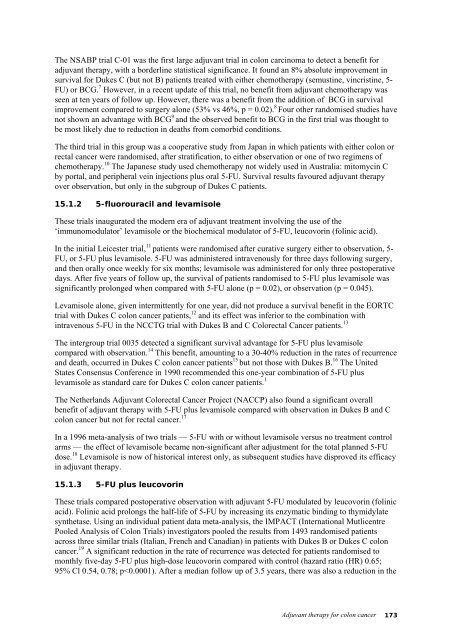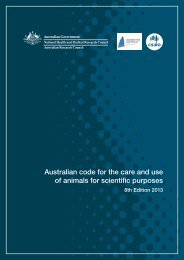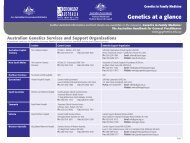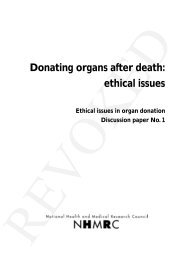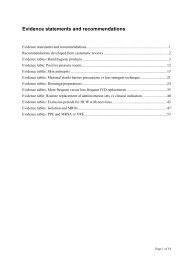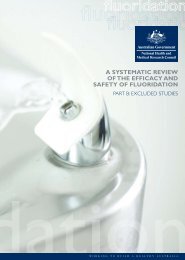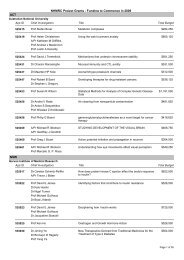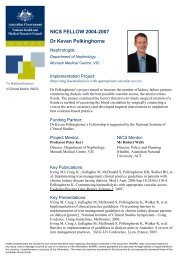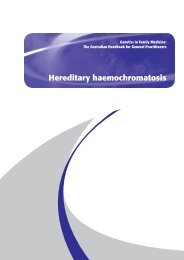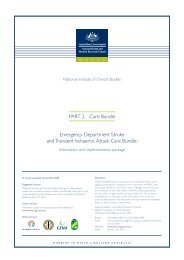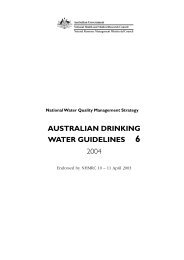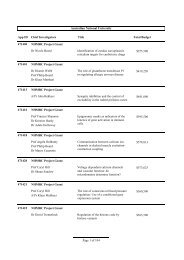Clinical Practice Guidelines - National Health and Medical Research ...
Clinical Practice Guidelines - National Health and Medical Research ...
Clinical Practice Guidelines - National Health and Medical Research ...
Create successful ePaper yourself
Turn your PDF publications into a flip-book with our unique Google optimized e-Paper software.
The NSABP trial C-01 was the first large adjuvant trial in colon carcinoma to detect a benefit for<br />
adjuvant therapy, with a borderline statistical significance. It found an 8% absolute improvement in<br />
survival for Dukes C (but not B) patients treated with either chemotherapy (semustine, vincristine, 5-<br />
FU) or BCG. 7 However, in a recent update of this trial, no benefit from adjuvant chemotherapy was<br />
seen at ten years of follow up. However, there was a benefit from the addition of BCG in survival<br />
improvement compared to surgery alone (53% vs 46%, p = 0.02). 8 Four other r<strong>and</strong>omised studies have<br />
not shown an advantage with BCG 9 <strong>and</strong> the observed benefit to BCG in the first trial was thought to<br />
be most likely due to reduction in deaths from comorbid conditions.<br />
The third trial in this group was a cooperative study from Japan in which patients with either colon or<br />
rectal cancer were r<strong>and</strong>omised, after stratification, to either observation or one of two regimens of<br />
chemotherapy. 10 The Japanese study used chemotherapy not widely used in Australia: mitomycin C<br />
by portal, <strong>and</strong> peripheral vein injections plus oral 5-FU. Survival results favoured adjuvant therapy<br />
over observation, but only in the subgroup of Dukes C patients.<br />
15.1.2 5-fluorouracil <strong>and</strong> levamisole<br />
These trials inaugurated the modern era of adjuvant treatment involving the use of the<br />
‘immunomodulator’ levamisole or the biochemical modulator of 5-FU, leucovorin (folinic acid).<br />
In the initial Leicester trial, 11 patients were r<strong>and</strong>omised after curative surgery either to observation, 5-<br />
FU, or 5-FU plus levamisole. 5-FU was administered intravenously for three days following surgery,<br />
<strong>and</strong> then orally once weekly for six months; levamisole was administered for only three postoperative<br />
days. After five years of follow up, the survival of patients r<strong>and</strong>omised to 5-FU plus levamisole was<br />
significantly prolonged when compared with 5-FU alone (p = 0.02), or observation (p = 0.045).<br />
Levamisole alone, given intermittently for one year, did not produce a survival benefit in the EORTC<br />
trial with Dukes C colon cancer patients, 12 <strong>and</strong> its effect was inferior to the combination with<br />
intravenous 5-FU in the NCCTG trial with Dukes B <strong>and</strong> C Colorectal Cancer patients. 13<br />
The intergroup trial 0035 detected a significant survival advantage for 5-FU plus levamisole<br />
compared with observation. 14 This benefit, amounting to a 30-40% reduction in the rates of recurrence<br />
<strong>and</strong> death, occurred in Dukes C colon cancer patients 15 but not those with Dukes B. 16 The United<br />
States Consensus Conference in 1990 recommended this one-year combination of 5-FU plus<br />
levamisole as st<strong>and</strong>ard care for Dukes C colon cancer patients. 1<br />
The Netherl<strong>and</strong>s Adjuvant Colorectal Cancer Project (NACCP) also found a significant overall<br />
benefit of adjuvant therapy with 5-FU plus levamisole compared with observation in Dukes B <strong>and</strong> C<br />
colon cancer but not for rectal cancer. 17<br />
In a 1996 meta-analysis of two trials — 5-FU with or without levamisole versus no treatment control<br />
arms — the effect of levamisole became non-significant after adjustment for the total planned 5-FU<br />
dose. 18 Levamisole is now of historical interest only, as subsequent studies have disproved its efficacy<br />
in adjuvant therapy.<br />
15.1.3 5-FU plus leucovorin<br />
These trials compared postoperative observation with adjuvant 5-FU modulated by leucovorin (folinic<br />
acid). Folinic acid prolongs the half-life of 5-FU by increasing its enzymatic binding to thymidylate<br />
synthetase. Using an individual patient data meta-analysis, the IMPACT (International Mutlicentre<br />
Pooled Analysis of Colon Trials) investigators pooled the results from 1493 r<strong>and</strong>omised patients<br />
across three similar trials (Italian, French <strong>and</strong> Canadian) in patients with Dukes B or Dukes C colon<br />
cancer. 19 A significant reduction in the rate of recurrence was detected for patients r<strong>and</strong>omised to<br />
monthly five-day 5-FU plus high-dose leucovorin compared with control (hazard ratio (HR) 0.65;<br />
95% Cl 0.54, 0.78; p


